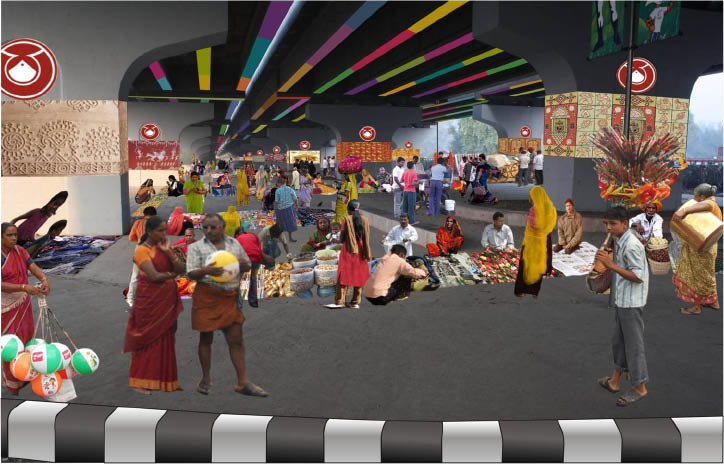In a matter of 15 minutes a deserted road facing the capital’s Indira Gandhi Stadium complex comes alive with a colorful ensemble of clothing and other utilities. Street vendors gather here every Sunday to set up a bazaar, which, its promoters say, could serve as a global model.
“The idea is to set up a global model market by utilizing spaces which are usually considered as wasteland and ensuring safe and secure workplace to the poor vendors who are displaced every now and then,” explained Ankita Upreti of the Self-Employed Women’s Association (SEWA) which is responsible for the evolution of the bazar to its present avatar.
Even Delhi Chief Minister Sheila Dikshit, after witnessing a power point presentation last year, was intrigued.
The bazar has some 1,000 vendors who were scattered in various parts of the city till SEWA came into the picture in 2009 when the market was shifted out due to the construction of a flyover as part of a Commonwealth Games project.
“A long legal battle has gone into the evolution of this Sunday bazaar. It was removed from the Ring Road bypass because the flyover’s construction started in 2009 before the Commonwealth Games,” according to Geetabehn, 46, a street vendor and member of the SEWA self-help group.
Then followed a series of elaborate power-point presentations, pitching plans to government officials and mobilizing the vendors, Upreti, SEWA’s legal coordinator, said.
“We met the architect before the construction work on the flyover began. The idea of having a street vendors’ market beneath the flyover was put forth, which he liked,” she added.
“The plan was then meticulously included in the site plan. The Public Works Department (PWD) wanted the site to be properly maintained and asked SEWA to execute an agreement,” Upreti said.
In the agreement with the PWD in May 2011, SEWA took up the task of cleaning, beautifying and maintaining the market. While an attendance record is maintained for the vendors who sit here Sundays, there are zero-traffic issues because of organizational clarity.
Every Sunday, the market is abuzz with buyers from noon until 3 p.m. Buyers range from traders from Uttar Pradesh and Haryana to consumers who want an easy bargain.
“This market is a one-stop shop for small town traders and consumers who want to buy clothes and second-hand utilities. It is also providing a livelihood for the vendors displaced by the Games construction work,” Geeta, who hails from Ahmedabad, added.
The 1,000 vendors, nearly 800 of whom are from Gujarat, on the other six days of the week, go around various neighborhoods in the capital, collecting old clothes and other discarded household goods in exchange for new utensils. These are then spruced up and sold at the Sunday bazar.
Their Sunday earnings range from Rs. 2,000 to Rs. 5,000, the vendors say.
Even as buyers straddle across pavements sifting through items on offer, the bazaar amazes one as it is clean and well-managed. With spaces earmarked for authorized vendors, there is no chaos and loud-calling from sellers, unlike at other weekly markets.
This, in fact, is what distinguishes the bazar from the 268 other weekly markets in the city.
Leelabehn, 55, sits content in a corner of the market, as the veteran has seen its face changing over the last decade. She has traversed every twist and turn in the evolution of this bazaar, she says.
“The change I see here is the sense of security that has been brought in. Unlike other places I have sat at, there is no stench of public toilets, no druggists and not even demands for protection money,” Leela said.

